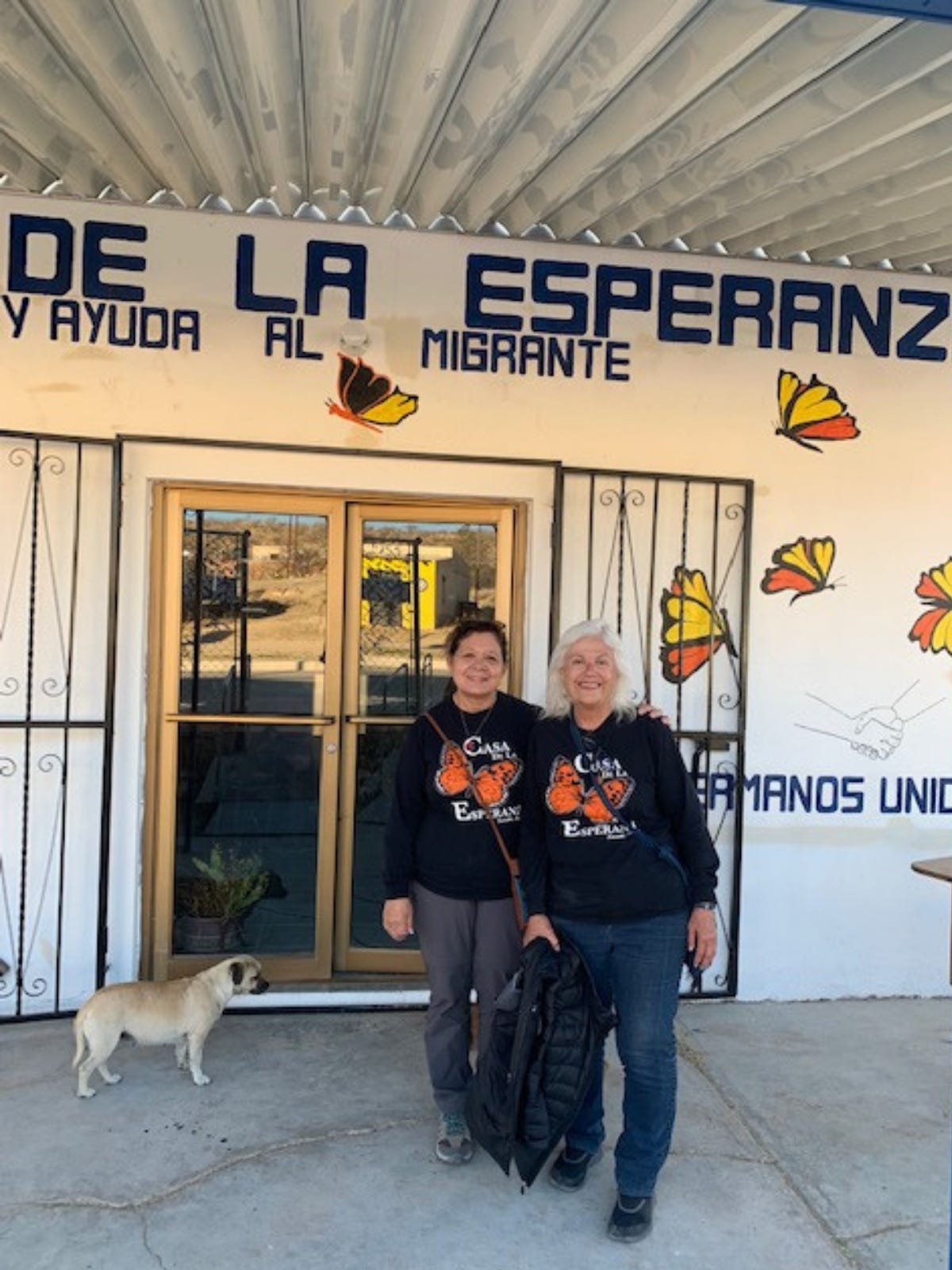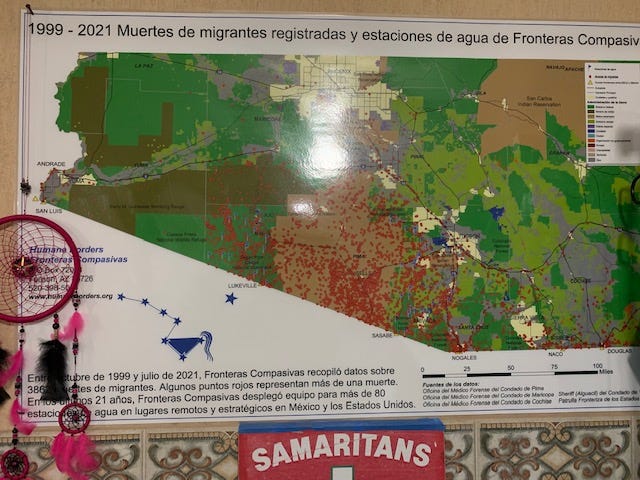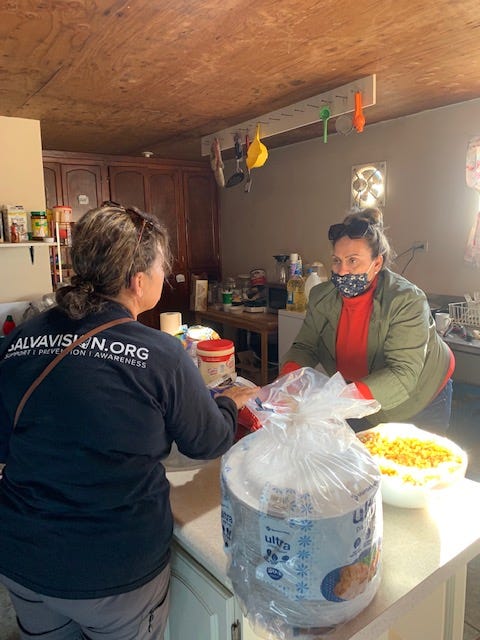In the wake of mass deportations under Title 42, residents from Tucson to Sásabe, Sonora, have pooled their resources to found migrant resource centers in Mexican border towns.

A young woman sits alone nursing her bandaged leg. Here, at the Casa de la Esperanza, a migrant resource center in Sásabe, Sonora, a portable heater warms her on a cold, blustery afternoon. Her name is Sandra, she tells me, and she is 27. She is from Guatemala, and this is the fourth time in two months that she’s been apprehended by the Border Patrol and sent back to Mexico. This last time, she fell into a ravine and twisted her leg as border agents chased her. Now her leg is swollen and bruised, and she can barely walk.
Sitting nearby is a group of young indigenous men, huddled at a table. “What is the name of this place?” one of them asks. At the center they can phone their families back home in Guatemala.
I write down the name Sásabe, Sonora, for them on a white piece of paper. One of the men takes the paper and examines it, looking puzzled, no doubt wondering how he will explain this remote, arid place to his family back home in the forested Guatemalan highlands.
Hanging on the wall behind them is a map of the southern Arizona desert with a red dot marking every place where a migrant has been found dead. They do their best to ignore it. The map is a sea of red.

Sásabe is a small outpost of 1,200 people at the mouth of the Altar Valley, which stretches 70 miles north to Tucson. There are a few low-slung adobe and concrete block homes with a main street and a barren plaza carved out of a patch of desert. The tiny town, which has no health clinics or buses or other services, was almost never used for repatriations, according to a Customs and Border Protection spokesperson. But then, in March 2020, the Trump administration implemented Title 42, a federal statute that, in the name of protecting U.S. citizens from Covid-19, ordered the Border Patrol to automatically expel migrants without due process or an option to seek asylum.
After Title 42 was initiated, more than 150 deported people began arriving in Sásabe every day, at all hours, said Gail Kocourek, cofounder of Casa de la Esperanza. “Our government is not supposed to deport people into a community without any services,” Kocourek said. “But Border Patrol was just dumping literally hundreds of people at Sásabe, and the community had no way to feed them or help them.”

Seeing the incredible need, Kocourek, an educator and longtime Tucson Samaritan, teamed up with Dora Rodriguez, a retired Tucson social worker and former refugee from El Salvador’s civil war, who nearly died in 1980 trekking through the same stretch of desert. Together, they opened Casa de la Esperanza in May 2021. It is one of two migrant resource centers that was opened in the last two years by volunteers from Mexico and Arizona in Mexican border communities as the number of migrants expelled under Title 42 reached more than 1.1 million in 2021, as the Biden Administration continued the removals. In the first four months of CBP’s 2022 fiscal cycle, more than 344,517 people have been expelled under the public health statute, even though a top official at the Centers for Disease Control said the removals are not needed to contain Covid.
There are no migrant shelters in Sásabe. The nearest is in Altar, which is 73 miles south. The entire corridor is under the control of organized crime, which oversees the human-smuggling routes in the area where migrants pay anywhere from $3,000 to $10,000 for the journey from their home country to their destination in the United States. The price, according to a migrant I spoke with, depends on the distance and whether they will be driven much of the way or walk for several days in the desert.
Rodriguez said they opened the center as close as possible to the Sásabe port of entry so that migrants have a chance to arrive there before being kidnapped by cartel members in town.
“The migrants are charged by the cartel for everything,” said Rodriguez. “For water, for food. Everything costs money.”
The Border Patrol deports 30 to 40 people a day, according to Rodriguez. A CBP spokesperson would not confirm this, writing in an email that the agency does not report removals “below the field office and sector level.” CBP is no longer removing people at night in Sásabe, wrote the spokesperson, or sending women with children to the remote town. Rodriguez confirmed that removals were no longer happening at night, but she said the center has received mothers traveling with small children as recently as January.
By the time a migrant like Sandra arrives at the center’s door, she may have attempted multiple crossings in the desert and be dehydrated and injured. “I just want to go home,” Sandra told me. “But I have no money. I have nothing.”
Despite promising to restore asylum and the immigration system, the Biden administration has kept Title 42 in place, which has raised apprehension numbers at the border as migrants make multiple attempts to cross in more remote and deadly places. Deaths in the desert have sharply increased. In 2020 the remains of 239 people were recovered in the southern Arizona desert—the highest since 2000, when large numbers of remains first began to be recovered. In 2021, 226 bodies were recovered and 2022 is already projected to be another extremely deadly year.
Sandra said she was left behind by her guide in the desert and held at gunpoint in the brush. She was lucky to have survived, but what had her in tears was the thought of returning home without money and in even deeper debt. Her five children don’t have enough food, which was why she had come, she said, hoping to find work in the United States. “I just need to work,” she said.
At the center, Sandra and other returning migrants receive a plate of warm food, a shower, and a set of clothes and shoes. A trained nurse from Sásabe is paid a modest fee every month to attend to injuries like Sandra’s. Many of the migrants who arrive at the shelter are suffering from exposure, dehydration, badly blistered feet, and trauma from their experiences in the desert. Some have been lost for days. Some have been raped or seen others die.
Rodriguez gave Sandra a hug and told her that a driver employed by the center would take her to the shelter in Altar for her safety. And from there, the center could buy her a bus ticket back to the Mexico-Guatemala border so that she could return home. Rodriguez promised to put her in contact with a group of women in Sandra’s hometown of San Marcos who work with Salvavision and other nonprofits to sell their embroidery in the United States.
Four women from Sásabe help run the center. And Kocourek and Rodriguez come down every week to bring food and other donations. Ofelia LaBrava, who lives near the center, said it has been a huge help to her town. “We had no way of helping them,” she said. “The town felt sorry for the migrants. They were sleeping in the plaza and there was nothing for them here. We didn’t know what to do.”
Now LaBrava cooks and cleans at the center during the afternoons. “At least now there is a place for people to go,” she said.
Rodriguez and Kocourek said humanitarian groups in Tucson and residents in Sásabe helped make the center a reality. “We had no money, but the humanitarian work in Arizona is amazing,” Rodriguez said. “We have a lot of strong organizations supporting us.”
It’s a challenge, Rodriguez said, to find the funding to sustain the center, which costs about $2,500 a month to run. Her nonprofit Salvavision, which supports asylum seekers and migrants, provides some funding. Sister organizations including Tucson Samaritans, No More Deaths, Casa Alitas and Humane Borders also support the resource center, as do some private donors. “Everyone understood the need and was on board immediately,” Rodriguez said.
Casa de la Esperanza has been open nearly a year, and it currently serves about 1,200 people a month, said Rodriguez, mostly Central Americans and Mexicans. Formerly a restaurant, the center has two new ramadas out front and a fresh coat of white paint, along with decorative monarch butterflies and a welcome sign for migrants. It’s come a long way since September 2020, when Rodriguez, Kocourek, and Sister Judy Bourg, a longtime volunteer at the migrant resource center and shelter in Agua Prieta, Sonora, discovered that hundreds of migrants were being expelled to the remote desert town.
“Our mission is to restore some of their dignity,” Rodriguez said, “with a hot meal and a little hope.”
For information about volunteering or donating to Casa de la Esperanza contact Dora Rodriguez at info@salvavision.org
The Border Chronicle is a reader-supported publication. Consider becoming a free or paid subscriber.
You can donate to support Salvavision on the organization’s website, salvavision.org – or by making a tax deductible donation to Llacuna.org in support of Salvavision’s sustainability efforts.
PrintRadio Free | Radio Free (2022-03-11T04:30:43+00:00) “A Hot Meal and a Little Hope”: Border Residents Step Up to Help Migrants. Retrieved from https://www.radiofree.org/2022/03/11/a-hot-meal-and-a-little-hope-border-residents-step-up-to-help-migrants/
Please log in to upload a file.
There are no updates yet.
Click the Upload button above to add an update.